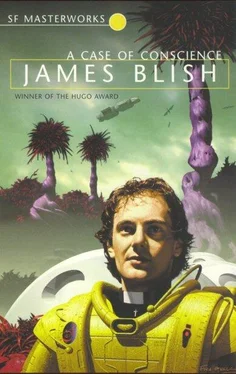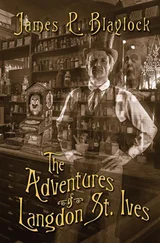Then Chtexa was back, recognizable not so much by any physical detail-for his wattles were now the same ambiguous royal purple as those of most of the other Lithians in the crowd-as by the fact that he was bearing down upon the Earthman.
“I have sent your message,” he said at once. “It is recorded at Xoredeshch Gton. But the other Earthmen are not there. They have not been in the city for some days.”
That was impossible. Cleaver had said he had spoken to Michelis only a day ago. “Are you sure?” Ruiz-Sanchez said cautiously.
“It admits of no uncertainty. The house which we gave them stands empty. The many things which they brought with them to the house are gone.” The tall shape raised its four-fingered hands in a gesture which might have been solicitous. “I think this is an ill word. I dislike to bring it you. The words you brought me when first we met were full of good.”
“Thank you. Don’t worry,” Ruiz-Sanchez said distractedly. “No man could hold the bearer responsible for the word, surely.”
“The bearer also has responsibilities; at least, that is our custom,” Chtexa said. “No act is wholly free. And as we see it, you have lost by our exchange. Your words on iron have been shown to contain great good. I would take pleasure in showing you how we have used them, especially since I have brought you in return an ill message. If you could share my house tonight, without prejudice to your work, I could expose this matter. Is that possible?”
Sternly Ruiz-Sanchez stifled his sudden excitement. Here was the first chance, at long last, to see something of the private life of Lithia, and through that, perhaps, to gain some inkling of the moral life, the role in which God had cast the Lithians in the ancient drama of good and evil, in the past and in the times to come. Until that was known, the Lithians in their Eden might be only spuriously good: all reason, all organic thinking machines, ULTIMACs with tails-and without souls.
But there remained the hard fact that he had left behind in his house a sick man. There was not much chance that Cleaver would awaken before morning. He had been given nearly fifteen milligrams of sedative per kilogram of body weight. But sick men are like children, whose schedules persistently defy all rules. If Cleaver’s burly frame should somehow throw that dose off, driven perhaps by some anaphylactic crisis impossible to rule out this early in his illness, he would need prompt attention. At the very least, he would want badly for the sound of a human voice on this planet which he hated, and which had struck him down almost without noticing that he existed.
Still, the danger to Cleaver was not great. He most certainly did not require a minute-by-minute vigil; he was, after all, not a child, but an almost ostentatiously strong man.
And there was such a thing as an excess of devotion, a form of pride among the pious which the Church had long found peculiarly difficult to make clear to them. At its worst, it produced the hospital saints, whose attraction to noisome-ness so peculiarly resembled the vermin-worship of the Hindi sects-or a St. Simon Stylites, who though undoubtedly acceptable to God had been for centuries very bad public relations for the Church. And had Cleaver really earned the kind of devotion Ruiz-Sanchez had been proposing, up to now, to tender him as a creature of God-or, to come closer to the mark, a godly creature?
And with a whole planet at stake, a whole people-no, more than that, a whole problem in theology, an imminent solution to the vast, tragic riddle of original sin… What a gift to bring to the Holy Father in a jubilee year-a grander and more solemn thing than the proclamation of the conquest of Everest had been at the coronation of Elizabeth II of England! Always providing, of course, that this would be the ultimate outcome of the study of Lithia. The planet was not lacking in hints that something quite different, and fearful beyond all else, might emerge under Ruiz-Sanchez’ prolonged attention. Not even prayer had yet resolved that doubt. But should he sacrifice even the possibility of this, for Cleaver?
A lifetime of meditation over just such cases of conscience had made Ruiz-Sanchez, like most other gifted members of his order, quick to find his way to a decision through all but the most complicated of ethical labyrinths. All Catholics must be devout; but a Jesuit must be, in addition, agile.
“Thank you,” he said to Chtexa, a little shakily. “I will share your house very gladly.”
(A voice): “Cleaver? Cleaver! Wake up, you big slob. Cleaver! Where the hell have you been?”
Cleaver groaned and tried to turn over. At his first motion, the world began to rock, gently, sickeningly. He was awash in fever. His mouth, seemed to be filled with burning pitch.
“Cleaver, turn out. It’s me-Agronski. Where’s the Father? What’s wrong? Why didn’t we ever hear from you? Look out, you’ll-”
The warning came too late, and Cleaver could not have understood it anyhow. He had been profoundly asleep, and had no notion of his situation in space or time. At his convulsive twist away from the nagging voice, the hammock rotated on its hooks and dumped him.
He struck the floor stunningly, taking the main blow across his right shoulder, though he hardly felt it yet. His feet, not yet part of him at all, still remained far aloft, twisted in the hammock webbing.
“What the hell-”
There was a brief chain of footsteps, like chestnuts dropping on a roof, and then a hollow noise of something hitting the floor near his head.
“Cleaver, are you sick? Here, lie still a minute and let me get your feet free. Mike-Mike, can’t you turn the gas up in this jug? Something’s wrong back here.”
After a moment, yellow light began to pour from the glistening walls, and then the white glare of the mantles. Cleaver dragged an arm across his eyes, but it did him no good; it tired too quickly. Agronski’s mild face, plump and anxious, floated directly above him like a captive balloon. He could not see Michelis anywhere, and at the moment he was just as glad he couldn’t. Agronski’s presence was hard enough to understand.
“How… the hell…” he said. At the words, his lips split painfully at both corners. He realized for the first time that they had become gummed together, somehow, while he was asleep. He had no idea how long he had been out of the picture.
Agronski seemed to understand the aborted question. “We came in from the Lakes in the ’copter,” he said. “We didn’t like the silence down here, and we figured we’d better come in under our own power, instead of registering in on the regular jet liner and tipping the Lithians off-just in case there’d been any dirty work afloat-”
“Stop jawing him,” Michelis said, appearing suddenly, magically in the doorway. “He’s got a bug, that’s obvious. I don’t like to feel pleased about misery, but I’m glad it’s that instead of the Lithians.”
The rangy, long-jawed chemist helped Agronski lift Cleaver to his feet. Tentatively, despite the pain, Cleaver got his mouth open again. Nothing came out but a hoarse croak.
“Shut up,” Michelis said, not unkindly. “Let’s get him back into the hammock. Where’s the Father, I wonder? He’s the only one capable of dealing with sickness here.”
“I’ll bet he’s dead,” Agronski burst out suddenly, his face glistening with alarm. “He’d be here if he could. It must be catching, Mike.”
“I didn’t bring my mitt,” Michelis said drily. “Cleaver, lie still or I’ll have to clobber you. Agronski, you seem to have dumped his water bottle; better go get him some more, he needs it. And see if the Father left anything in the lab that looks like medicine.”
Читать дальше











